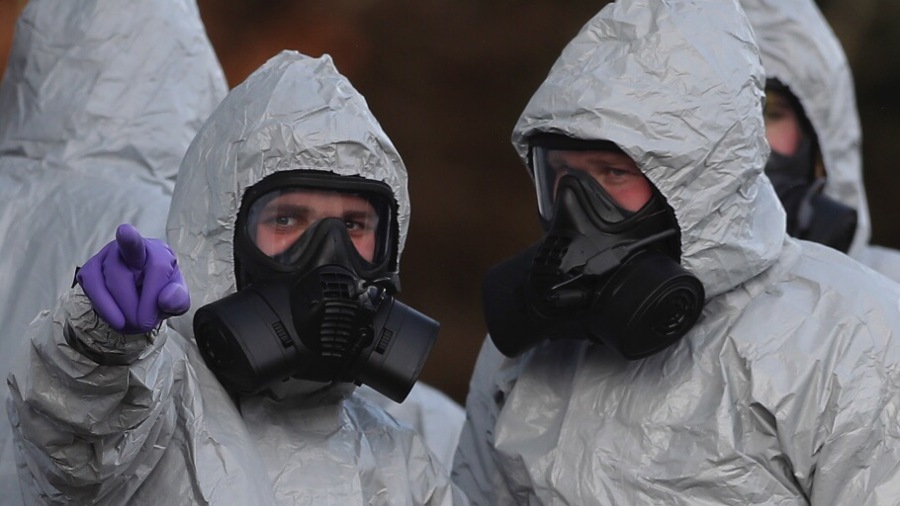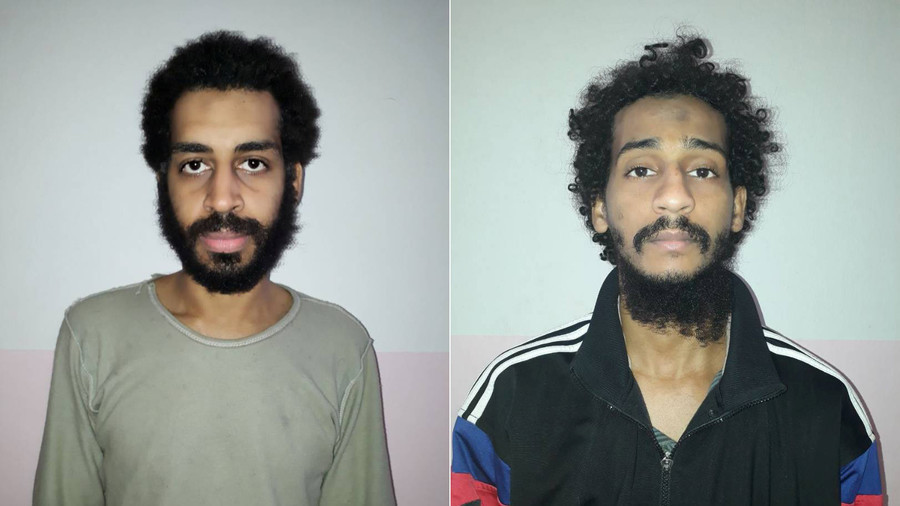Moscow confronts London with 14 questions on ‘fabricated’ Skripal case
 RT,
31
March, 2018
RT,
31
March, 2018
Russia’s
Embassy in London has sent a list of 14 questions to the UK Foreign
Ministry, demanding that it reveals details of the investigation into
the nerve-agent poisoning of former double agent Sergei Skripal and
his daughter.
The questions,
provided in full below, include a demand to clarify whether samples
of the nerve agent А-234 (also known as “Novichok”) have ever
been developed in the UK. The embassy’s statement calls the
incident that started the recent diplomatic row a “fabricated
case against Russia.”
1. Why
has Russia been denied the right of consular access to the two
Russian citizens, who came to harm on British territory?2. What
specific antidotes and in what form were the victims injected with?
How did such antidotes come into the possession of British doctors at
the scene of the incident?3. On
what grounds was France involved in technical cooperation in the
investigation of the incident, in which Russian citizens were
injured?4. Did
the UK notify the OPCW (Organization for the Prohibition of Chemical
Weapons) of France’s involvement in the investigation of the
Salisbury incident?5. What
does France have to do with the incident, involving two Russian
citizens in the UK?6. What
rules of UK procedural legislation allow for the involvement of a
foreign state in an internal investigation?7. What
evidence was handed over to France to be studied and for the
investigation to be conducted?8. Were
the French experts present during the sampling of biomaterial from
Sergei and Yulia Skripal?9. Was
the study of biomaterials from Sergei and Yulia Skripal conducted by
the French experts and, if so, in which specific
laboratories?10. Does
the UK have the materials involved in the investigation carried out
by France? 11. Have
the results of the French investigation been presented to the OPCW
Technical Secretariat?12. Based
on what attributes was the alleged “Russian origin” of the
substance used in Salisbury established?13. Does
the UK have control samples of the chemical warfare agent, which
British representatives refer to as “Novichok”?14. Have
the samples of a chemical warfare agent of the same type as
“Novichok” (in accordance to British terminology) or its
analogues been developed in the UK?
A
similar list, containing 10 questions,
was sent to the French Foreign Ministry by the Russian Embassy in
Paris. According to the document, Moscow wanted to know on what
grounds France was involved in the British investigation into the
Skripal poisoning.
It
demanded that Paris reveal what kind of evidence was handed over to
France by the UK, and also inquired if French experts were in
possession of the samples of the nerve agent А-234 (also known as
“Novichok”) or biomaterials from Sergei and Yulia Skripal.
Russia
also demanded explanations on what made French experts conclude that
the substance used in Salisbury attack was nerve agent А-234 and
that it was of Russian origins. The final question on the list
read: “Have
the samples of a chemical warfare agent of this type or its analogues
been developed in France and if so, for what purpose?”
Sergei
Skripal and his daughter, Yulia, were discovered on a bench in
Salisbury in early March, with the UK claiming a Soviet-designed
nerve agent was used against them. Without a proper investigation
being carried out, London said it was “highly likely” that Russia
was responsible for the attack and introduced sanctions against the
country, including the expulsion of Russian diplomats.
Moscow
has denied all accusations, decrying them as a “provocation,” and
demanded proof from the British side. However, London refused to
cooperate with Russia on the case, denying its consular staff access
to Russian citizen Yulia Skripal and turning down the request to
provide a sample of the toxic substance in question.

Over 50 affected as Russia downsizes UK diplomatic mission in tit-for-tat response

Moscow’s
decision to have the UK downsize its diplomatic presence in Russia to
be equal to that of Moscow in London means that it must cut over 50
jobs at the British mission, according to the Russian foreign
ministry.
On
Friday, Russia announced its response to the UK’s expulsion of 23
Russian diplomats that London linked to double agent Sergei Skripal’s
poisoning. In addition to expelling 23 British diplomats, Moscow also
gave London one month to downsize its diplomatic presence in Russia.
The
final number of staff in Russia should be equal to the number of
staff at the Russian diplomatic mission in Britain. Similar measures
were taken in response to the American expulsion of Russian diplomats
over alleged interference in the 2016 presidential election in the
US.
Britain says Aeroflot plane was searched to protect UK from ‘organized crime & harmful substances’

The
controversial search of a Russian plane by British officials at
Heathrow Airport was conducted to protect the UK from organized crime
and the smuggling of harmful substances, the UK security minister has
said.
Moscow
had described the search of an Aeroflot plane as “illegal” and
called for an explanation from British authorities.
“It
is routine for [UK] Border Force to search aircraft to protect the UK
from organized crime and from those who attempt to bring harmful
substances like drugs or firearms into the country,” UK
Security Minister Ben Wallace said on Saturday. He insisted that once
the “checks
were carried out,” the
aircraft “was
allowed to carry on with its onward journey.”
The
justification presented by London “only
aggravates our doubts as to the real intentions of the team” that
performed the unlawful search, the Russian Embassy in the UK said in
response to the statement. Aeroflot and Russian airports “observe
strict international security standards” on the presence of
firearms and drugs on board and did not “give rise to doubts in
that respect,” it
added.

Photos
provided by SDF on February 9, 2018, showing captured ISIS members
Alexanda Kotey and Shafee Elsheikh © SDF handout / Reuters
Two
British ISIS members have described their brutal execution of
hostages as “regrettable.” The men also said that the British
government’s decision to revoke their citizenship denied them the
chance of a fair trial.
El
Shafee Elsheikh and Alexanda Amon Kotey were allegedly part of a
four-member Islamic State (IS, formerly known as ISIS/ISIL) cell
known as “The Beatles.” The cell became known for its brutal
execution videos of hostages, including American journalists Steven
Sotloff and James Foley in 2014.
The
cell’s leader, Mohammed Emwazi, became known as “Jihadi John,”
and appeared in many of the group’s videos, threatening the west
from behind a mask. Emwazi was “evaporated”in a coalition drone
strike in Raqqa, Syria in November 2015. Another member of the group,
Aine Lesley Davis, was arrested in Turkey last year and sentenced to
seven years in prison.
The
Russians are being too damned civilised in the circumstances.
Russia
has no plans to cease cultural cooperation with the United Kingdom
and hopes that this sphere will continue to stay away from politics
amid the ongoing diplomatic row with the United Kingdom, Russia's
Deputy Culture Minister Alexander Zhuravsky said on Saturday.
"We
have never unilaterally initiated to break off relations or cease
cultural ties, that is why in this case… there were no unfriendly
actions from the Ministry of Culture… We hope that culture will
stay out of politics as before,"
No
warning given. They ordered the crew out and when the pilot refused
to leave they shut him in the cockpit: no witnesses to the search.
From
the Deutsche Wirtschafts Nachrichten: Friday evening the British
Border and Customs authority at the London Heathrow airport, with no
warning, searched an Aeroflot airliner in from Moscow. Contrary to
the rules of international air travel, according to the airline, they
ordered the pilot and the crew to leave the plane. The pilot refused,
having regard to his duties as a captain. He was, as the Russian
state-owned news Agency TASS, reported, forced to stay the cockpit,
while the authorities were searching the plane.
The
BBC reported that it had received the information on the customs
action from the British foreign Ministry. In recent days the foreign
Minister, Boris Johnson has stepped up his particularly sharp public
criticism of Russia.
Russia
lodged a sharp protest according to the spokeswoman of the foreign
Ministry, Maria Zakharova against this deed of the authorities.
Russia calls on London to return to the international practices in
air travel. “The behavior of the British police is a clear
demonstration of the desire to board and tamper without a witness,”
said Zakharova in the radio station Rossiya 24, according to RIA.
Employees
of the Russian Ambassador went to the airport to investigate the
situation.





No comments:
Post a Comment
Note: only a member of this blog may post a comment.